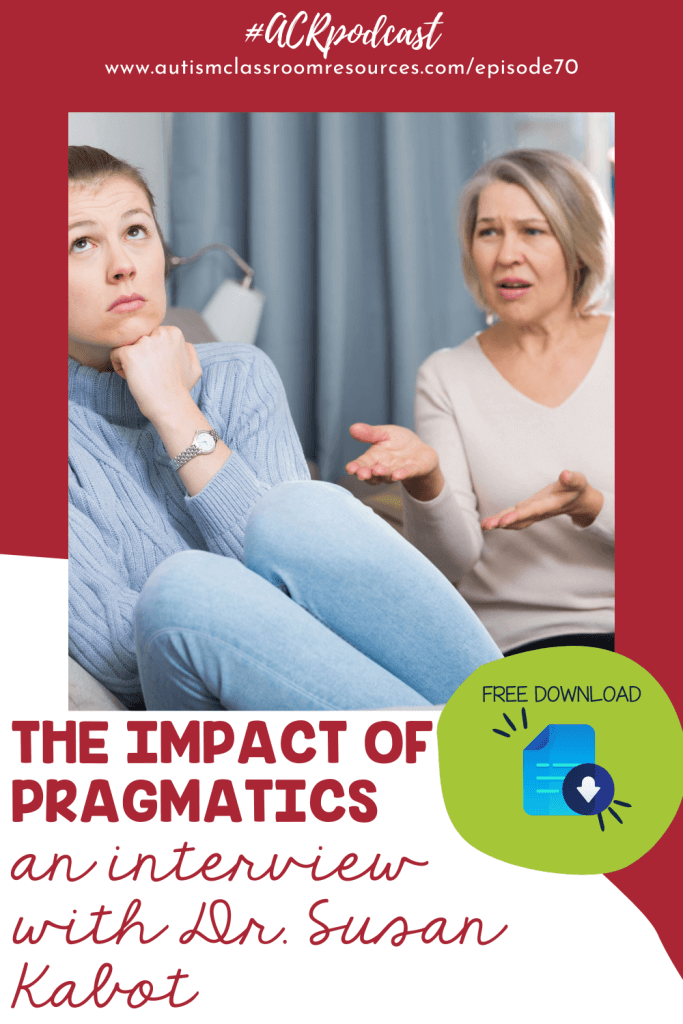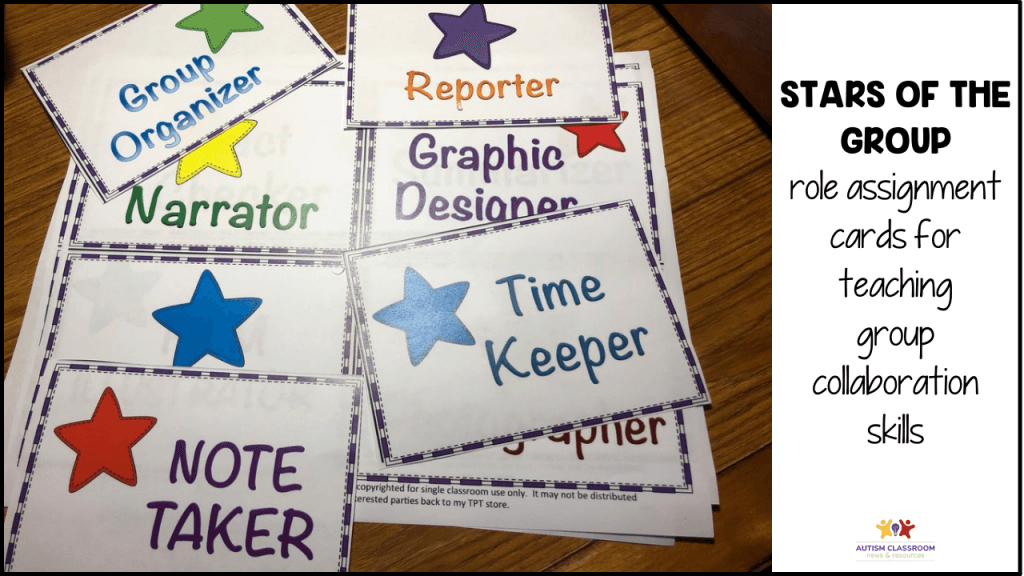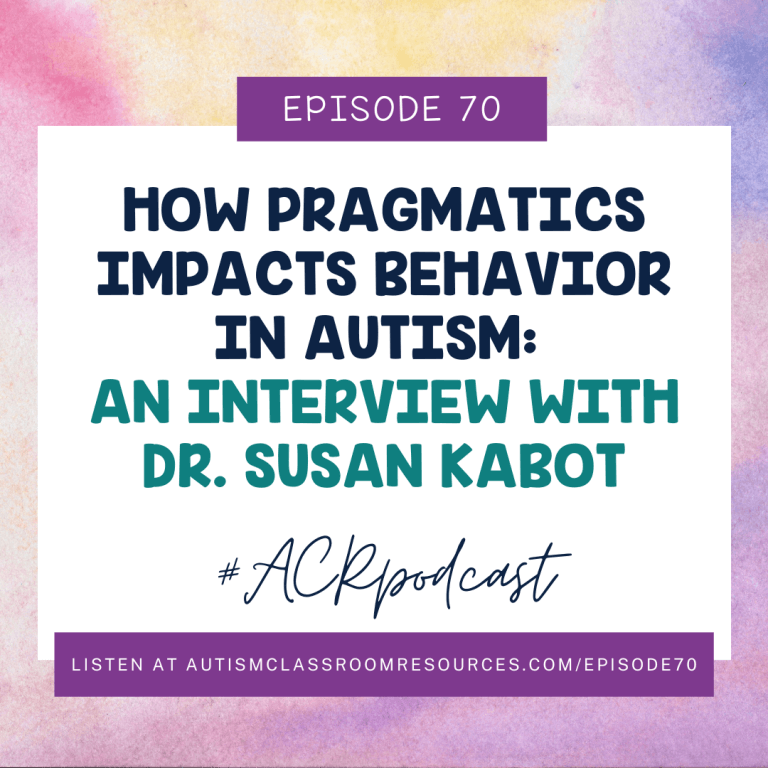Welcome back to the Autism Classroom Resources podcast. I’m Chris Reeve, and I’m your host. And I’m extremely excited that you are here today to join us because I am joined by a dear friend of mine, Dr. Susan Kabot. Sue has her EDD in special education, and she is also a speech pathologist. And Sue and I have worked together probably for about 20 years. She has been my consultation partner, she is also the co-author with me on three of our books for educators for setting up classrooms, building independence and taming the data monster. So, those of you who found me through that, she is my writing partner and my partner in crime.
So, one of the things that Sue introduced me to early on in working together was the idea of pragmatics. And when I wanted to really explore, and talk about more how social skills impact the behavior of our students with autism that we serve in the general ed curriculum, who are on grade level or above, I really wanted you to understand the impact that pragmatics has. And she can definitely explain that better than I can. So, I’m actually going to divide this interview over two podcast episodes.
Focus of This Podcast
In this podcast, she’s going to talk about what pragmatics are and what it means and how it impacts both the students themselves, as well as how it impacts their behavior, and can lead to challenging behavior. And then, we will be back next week with the rest of the interview, where she’ll be talking about how we can address it, how it interfaces with other areas of social skills. Like the hidden curriculum that I talked about in episode 69 last week. And she’ll be talking about what she thinks is so important for teachers to walk away from all of this with. So, I want to leave lots of time for you to hear what she has to say. So, let’s get started
What Are Pragmatics?
Chris:
So, Sue, thank you for being here. And you are one of the people that knows more about pragmatics than anyone I’ve ever met. You introduced me to the whole concept. So, can you tell us exactly what exactly are pragmatics? Can you describe that for us, so that we can have a better understanding of it?
Sue:
Well, I think the easiest definition, although I don’t think it tells the whole picture, is that it’s the social use of language. So, when we think about speech and language, as a field, pragmatics is one of the areas that we focus on. Just like fluency, or voice, or language, or speech, pragmatics, the social use of language, is one of those major areas. And when we stop to think about how we use language, it’s really to communicate, to get messages across to other people, and to be able to act upon messages that other people are sending us.
And so, there is both an expressive and a receptive component to pragmatics. It’s pretty complicated because it’s not just the words we’re using, the language that we’re sending. But there are so many additional elements that add to that message. Things like our body posture, the way we stand when we’re delivering a message. It’s going to look different when someone’s very angry than when someone is very open to an idea that someone’s sharing with them. It’s also about vocal tone. So that, again, if we’re highly emotional in a negative way, our vocal tone is either going to be very loud, or very harsh versus our general normal speaking voice. It’s about gestures; they add to the message also. And so, when we think about communication, so much of the message that we’re sending is not just the words. And all of these additional elements are adding to what we’re saying to someone else, so that they can understand what we’re really trying to say. They’re getting our message because they’re understanding the emotional aspects, the physical aspects, as well as the words.
How Do Pragmatics Affect Individuals with ASD?
Chris:
So, how do issues with pragmatic impact individuals with autism, particularly those who people will call high functioning, or those who are functioning on an average or above average cognitive level?
Sue:
Well, I think those are the individuals that are more complex and make it more challenging. I’m trained as both a special educator and then, later on in my career, as a speech language pathologist. And one of the things that I found early on is that these higher functioning individuals whose cognitive skills are in the average range, or close to the average range and above, oftentimes, you kind of know there’s something wrong. But when you give them one of the standardized tests of language, they score in the close to average range, or the average range, because cognition, language are very much related usually.
Evaluating With Pragmatics
Sue:
And so, you’re looking at test scores saying, “I know there’s something wrong but look, they scored in the average range.” You really have to dig deep. And you really have to find, especially if you’re a school speech language pathologist, the measures that pick up issues in the area of pragmatics, because that’s where those higher functioning individuals are going to fall apart. They’re going to use language for a more limited range of reasons. We think about early pragmatic development and people with autism. They are very good at language and communication that’s used for behavioral regulation. They can ask for things they want. They can protest things they don’t want. They may have some quasi social communication going on, showing you something, leading you to something.
Functions of Communication
Sue:
But when it comes to real social communication, that’s where they fall down. So, as they get older, they’re going to develop some of those skills. It might be commenting on something they see, or hear to share with you. It might be asking you a question. It might be responding to a question that you asked them. Those functions are more social, truly social in nature. But those are later developing functions. And so, when you look at this back and forth communication with a higher functioning person with autism, they’re not going to be using language for the full range of intents that other people would be using them for. Certainly not independently, maybe with some prompting and modeling, but not independently.
What Should Teachers Think About Pragmatics And Behavior?
Chris:
Okay so, what do you think that teachers… What should your teachers think about in relation to pragmatics? We’ve been talking in the podcast… I’ve been talking about looking at challenging behavior for these higher functioning individuals. Because I think their behavior is a little bit more complex. It’s not a simple function with more transactional, “I want this, I get that.” It’s a little bit more esoteric to figure out. So, what do you think teachers should think about in relation to pragmatic when they are evaluating incidents of challenging behavior of an individual on the spectrum?
Sue:
Well, I think these are the issues that, especially for these higher functioning students that are in general education settings, the difficulty with pragmatics influences the way they’re perceived both by the teacher and by the other students, because they are “smart,” and I’ll put that in quotes. People expect them to have more control over themselves, and also to have more appropriate behavior. And things like students correcting the teacher, or students shouting out answers because they feel like every single question in the classroom that the teacher gives is directed to them. They don’t understand that there are other people in the classroom, other people need a turn to answer. And they’re just yelling out, and don’t have those self-regulation skills to wait to be called on. And they’re perceived, I don’t want to say the challenging behavior, like real challenging behavior, but the challenging behavior that’s more like nuisance behavior that drives the other students and the teachers crazy.
Spelling Is Important
Sue:
We used to have a child, I’ll never forget this story, he was very high functioning. He went to autism programming as a young child, and then went to regular elementary school and middle school. And he had a teacher who was not such a good speller. And she would put a word up on the board and it was spelled wrong. And he would raise his hand, she would call on him, and he would tell her she spelled the word wrong. And instead of immediately fixing the word, she just continued on with the lesson. She didn’t realize her not fixing it created immense anxiety in this student. And so, his hand went up again and there was more urgency to it. And he told her again that the word was spelled wrong, and she continued on her teaching. And it just escalated and got worse, and worse, and worse. And I think that’s more the kind of behavior that the pragmatics creates. I mean, clearly these higher functioning individuals have other issues in terms of self-regulation that are going to lead to more significant challenging behavior.
But the pragmatics leads to individuals being not really accepted by their peers. They don’t have the social communication skills to work in a cooperative learning group. They’re not balanced in terms of the terms that they take with a group, with other people. They could have a two-minute comment, and then let somebody else get in 10 seconds. And then, they’re back on with another two-minute comment. And so, there’s no feeling of reciprocity. Even though there is this turn-taking, it’s not balanced. And the individual with autism is not likely to be able to read the nonverbal cues that the other students, or the teacher are sending to them, because it’s all about these gestures and nonverbals, and things like maintaining the right physical distance between people. Those create difficulties interpersonally for our higher functioning students.
Pragmatics as Setting Events
Chris:
So it’s almost like pragmatics set students up to have bigger problems because it puts them at a disadvantage from the start.
Sue:
Almost like a setting event. We talk about our nonverbal kids not being able to communicate as a setting event. And that’s what this is. I think in the same way. It does set them up to have very difficult social interactions. I think it’s very confusing because there is such a social cast of pragmatics that to differentiate social skills versus pragmatics because of the social element. But pragmatics have that language base to them too, whereas social skills, which might be waiting for someone else to have a turn. If it doesn’t involve language it’s not going to be a pragmatic skill. In a conversation waiting for other people to have their turn talking would make it more in the realm of pragmatics. But there are social skills that are not language based that we’re teaching people all the time.
Summary and Free Group Role Cards
Dr. Christine Reeve: So, I hope that that gives you some good introduction to what pragmatics are. As I said, before I met Sue, I didn’t know what that word meant. And I think you’ve probably heard some common themes that you will have heard from me. Sue and I have worked together for a long time, including that pragmatics are setting events, which I have talked about, as well as the idea that smart is not enough. That we really do have to teach these skills in direct instruction for these students to make a difference. And I will put some related links in the blog post for this. I also have a free download for students working in groups, which is one of the areas that Sue noted is a problem for many of these students. And I will put that link in the blog post at autismclassroomresources.com/episode70. And you will also find all of the links to related posts that would be relevant for some of the things she talked about there as well.
You can reach Sue by email. And I hope that you’ll be back next week to hear the rest of this interview, where she talks about what teachers need to know, and how we can improve our students’ pragmatic skills, and socialization to improve behavior. Thank you so much for listening. Thank you so much for everything that you do for your students. And I hope to see you again next week.








